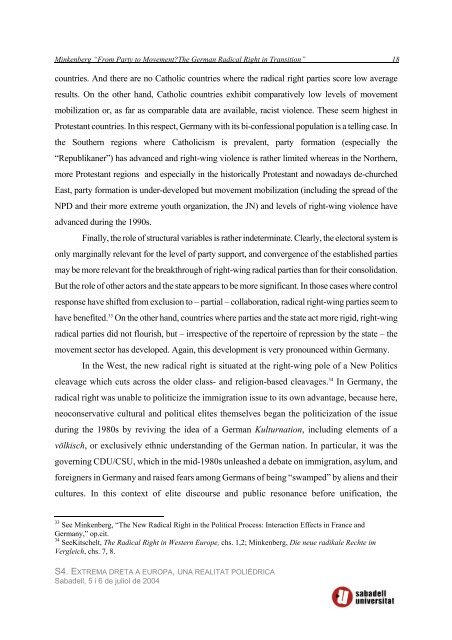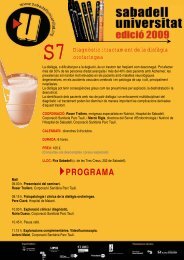From Party to Movement? The German Radical Right
From Party to Movement? The German Radical Right
From Party to Movement? The German Radical Right
You also want an ePaper? Increase the reach of your titles
YUMPU automatically turns print PDFs into web optimized ePapers that Google loves.
Minkenberg “<strong>From</strong> <strong>Party</strong> <strong>to</strong> <strong>Movement</strong>?<strong>The</strong> <strong>German</strong> <strong>Radical</strong> <strong>Right</strong> in Transition” 18<br />
countries. And there are no Catholic countries where the radical right parties score low average<br />
results. On the other hand, Catholic countries exhibit comparatively low levels of movement<br />
mobilization or, as far as comparable data are available, racist violence. <strong>The</strong>se seem highest in<br />
Protestant countries. In this respect, <strong>German</strong>y with its bi-confessional population is a telling case. In<br />
the Southern regions where Catholicism is prevalent, party formation (especially the<br />
“Republikaner”) has advanced and right-wing violence is rather limited whereas in the Northern,<br />
more Protestant regions and especially in the his<strong>to</strong>rically Protestant and nowadays de-churched<br />
East, party formation is under-developed but movement mobilization (including the spread of the<br />
NPD and their more extreme youth organization, the JN) and levels of right-wing violence have<br />
advanced during the 1990s.<br />
Finally, the role of structural variables is rather indeterminate. Clearly, the elec<strong>to</strong>ral system is<br />
only marginally relevant for the level of party support, and convergence of the established parties<br />
may be more relevant for the breakthrough of right-wing radical parties than for their consolidation.<br />
But the role of other ac<strong>to</strong>rs and the state appears <strong>to</strong> be more significant. In those cases where control<br />
response have shifted from exclusion <strong>to</strong> – partial – collaboration, radical right-wing parties seem <strong>to</strong><br />
have benefited. 33 On the other hand, countries where parties and the state act more rigid, right-wing<br />
radical parties did not flourish, but – irrespective of the reper<strong>to</strong>ire of repression by the state – the<br />
movement sec<strong>to</strong>r has developed. Again, this development is very pronounced within <strong>German</strong>y.<br />
In the West, the new radical right is situated at the right-wing pole of a New Politics<br />
cleavage which cuts across the older class- and religion-based cleavages. 34 In <strong>German</strong>y, the<br />
radical right was unable <strong>to</strong> politicize the immigration issue <strong>to</strong> its own advantage, because here,<br />
neoconservative cultural and political elites themselves began the politicization of the issue<br />
during the 1980s by reviving the idea of a <strong>German</strong> Kulturnation, including elements of a<br />
völkisch, or exclusively ethnic understanding of the <strong>German</strong> nation. In particular, it was the<br />
governing CDU/CSU, which in the mid-1980s unleashed a debate on immigration, asylum, and<br />
foreigners in <strong>German</strong>y and raised fears among <strong>German</strong>s of being “swamped” by aliens and their<br />
cultures. In this context of elite discourse and public resonance before unification, the<br />
33<br />
See Minkenberg, “<strong>The</strong> New <strong>Radical</strong> <strong>Right</strong> in the Political Process: Interaction Effects in France and<br />
<strong>German</strong>y,” op.cit.<br />
34<br />
SeeKitschelt, <strong>The</strong> <strong>Radical</strong> <strong>Right</strong> in Western Europe, chs. 1,2; Minkenberg, Die neue radikale Rechte im<br />
Vergleich, chs. 7, 8.<br />
S4. EXTREMA DRETA A EUROPA, UNA REALITAT POLIÈDRICA<br />
Sabadell, 5 i 6 de juliol de 2004













